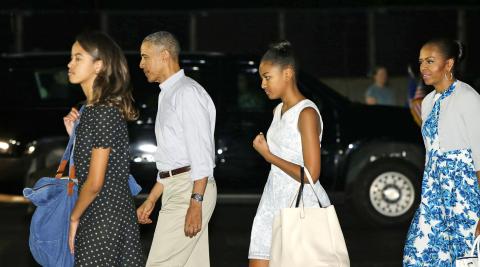North Korea said US accusations that it was involved in a cyberattack on Sony Pictures were “groundless slander” and that it wanted a joint investigation into the incident with the US.
An unnamed spokesman of the North Korean Ministry of Foreign Affairs said there would be “grave consequences” if Washington refused to agree to the joint probe, the official Korean Central News Agency reported yesterday.
On Friday, US President Barack Obama blamed North Korea for the devastating cyberattack, which led to the Hollywood studio canceling The Interview, a comedy on the fictional assassination of North Korean leader Kim Jong-un. He pledged that the US would respond “in a place and manner and time that we choose.”

Photo: Reuters
In its first substantive response to the accusation, North Korea said it could prove it had nothing to do with the attack.
“We propose to conduct a joint investigation with the US in response to groundless slander being perpetrated by the US by mobilizing public opinion,” the North Korean spokesman said. “If the US refuses to accept our proposal for a joint investigation and continues to talk about some kind of response by dragging us into the case, it must remember there will be grave consequences.”
Earlier, the US FBI announced that it had determined that North Korea was behind the hacking of Sony, saying Pyongyang’s actions fell “outside the bounds of acceptable state behavior.”
Obama said North Korea appeared to have acted alone.
It was the first time the US had directly accused another nation of a cyberattack of such magnitude on US soil and set up a possible new confrontation between Washington and Pyongyang.
Sony Pictures Entertainment chief executive Michael Lynton insisted the company did not capitulate to hackers and said it is still looking for alternative platforms to release The Interview.
A Sony spokeswoman said earlier in the week that the company did not have further release plans for the US$44 million film starring Seth Rogen and James Franco.
Despite Obama’s stern warning to North Korea, his options for responding to the computer attack by the impoverished state appeared limited. The president declined to be specific about any actions under consideration.

NATIONAL SECURITY THREAT: An official said that Guan Guan’s comments had gone beyond the threshold of free speech, as she advocated for the destruction of the ROC China-born media influencer Guan Guan’s (關關) residency permit has been revoked for repeatedly posting pro-China content that threatens national security, the National Immigration Agency said yesterday. Guan Guan has said many controversial things in her videos posted to Douyin (抖音), including “the red flag will soon be painted all over Taiwan” and “Taiwan is an inseparable part of China,” while expressing hope for expedited “reunification.” The agency received multiple reports alleging that Guan Guan had advocated for armed reunification last year. After investigating, the agency last month issued a notice requiring her to appear and account for her actions. Guan Guan appeared as required,

Japan and the Philippines yesterday signed a defense pact that would allow the tax-free provision of ammunition, fuel, food and other necessities when their forces stage joint training to boost deterrence against China’s growing aggression in the region and to bolster their preparation for natural disasters. Japan has faced increasing political, trade and security tensions with China, which was angered by Japanese Prime Minister Sanae Takaichi’s remark that a Chinese attack on Taiwan would be a survival-threatening situation for Japan, triggering a military response. Japan and the Philippines have also had separate territorial conflicts with Beijing in the East and South China

A strong cold air mass is expected to arrive tonight, bringing a change in weather and a drop in temperature, the Central Weather Administration (CWA) said. The coldest time would be early on Thursday morning, with temperatures in some areas dipping as low as 8°C, it said. Daytime highs yesterday were 22°C to 24°C in northern and eastern Taiwan, and about 25°C to 28°C in the central and southern regions, it said. However, nighttime lows would dip to about 15°C to 16°C in central and northern Taiwan as well as the northeast, and 17°C to 19°C elsewhere, it said. Tropical Storm Nokaen, currently

PAPERS, PLEASE: The gang exploited the high value of the passports, selling them at inflated prices to Chinese buyers, who would treat them as ‘invisibility cloaks’ The Yilan District Court has handed four members of a syndicate prison terms ranging from one year and two months to two years and two months for their involvement in a scheme to purchase Taiwanese passports and resell them abroad at a massive markup. A Chinese human smuggling syndicate purchased Taiwanese passports through local criminal networks, exploiting the passports’ visa-free travel privileges to turn a profit of more than 20 times the original price, the court said. Such criminal organizations enable people to impersonate Taiwanese when entering and exiting Taiwan and other countries, undermining social order and the credibility of the nation’s